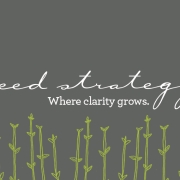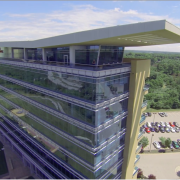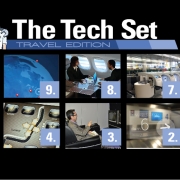Your Brain on Tech
Few would argue that technology isn’t having a profound effect on our minds. Even fewer would argue that those effects are actually… positive.
“It’s making us dumber.”
“It’s making us lazy.”
“It’s ruining our attention spans.”
“It’s ruining our memories.”
You don’t have to look too hard for dire-sounding press on the psychological effects of modern technology. A Google search will reveal articles, studies and top-10 lists galore, ranging in tone from cautious, to wary, to outright apocalyptic.
So is it all true? Is our burgeoning digital dependency really affecting our minds that much?
Yeah, probably.
Millennials take the brunt of the “tech rots your brain” backlash. It’s no surprise—they grew up with it. But the prevailing platitudes fail to consider one important factor: change is part of the human experience. Every new generation faces it. Every new generation adapts to it. That’s why it makes sense to embrace it. Understand it. And make the best of it.
Especially if you’re in marketing.
So let’s take a closer look at how technology is changing, and in many ways expanding, the human mind. Because the human mind is, after all, the single most important customer we’ll ever have.
The Engine of Ingenuity
Ready for a metaphor? Too late.
Our imaginations are like engines. They take raw, unrefined input (fuel, so to speak) and process it into… something better. So what fuels the engine between our ears?
Well, just about anything.
And never before in the history of history, has “just about anything” been more available, in such great quantities.
From endless information on the Internet, to constant contact with “friends” on social media, to movies, TV, music, video games and more, a biblical deluge of stimuli inundates our brains every day. And with so much more rattling around in there, the chance for meaningful (or at least interesting) connections becomes more and more likely.
For example: what do Vector art, your cousin’s new girlfriend, rap lyrics, and the Assyrian Empire have in common?
Who knows.
But, chances are, some element of all those things could come to life in a new idea, how someone solves a problem, makes a decision or interprets a message.
Greg Satell, well-known columnist for Forbes and the Harvard Business Review, uses the term “Synthesizing Domains” to describe the process of cross-pollination across diverse informational inputs. In his editorial How Technology Enhances Creativity, Satell turns to great artists and thinkers, citing their divergent experiences as the greatest influences on their ideas: Picasso’s exposure to African art, Darwin’s unique experience with both economics and geology.
“Innovation is largely the art of combination.”
–Greg Satell, Forbes
Satell’s point is that in the digital age, “Domain Synthesis” can, and does, happen all the time—no African safari required. Plain and simple, innovation depends on inspiration. And, thanks to technology, there’s a lot of it out there these days.
MIND OVER MARKETING:
The Internet is a fertile ground for creative cross-pollination. And with more creative connections, there’s more potential for unique ideas and opinions… especially about products, services and anything else with a price tag.
Attention Deficit… in Order
“The proportion of 17-year-olds who read nothing whatsoever (unless required to do so for school) more than doubled between 1984 and 2004—a period that oversaw the rise of personal computers, the Internet and video games.”
Attention span is rarely touted as a virtue of the millennial generation: less reading, less news, less broadcast television. If it doesn’t involve a touch screen, streaming video or artisanal farm-raised ingredients, millennials seem to get bored pretty quick.
But what is boredom, really? Perhaps we need an updated definition, more suitable for the digital age: “The intolerance of unstimulating, unmeaningful or uninspiring stimuli.”
Look it at that way, and the idea of boredom takes on a whole new dimension.
Growing up digital, millennials have had to be selective with their cognitive inputs. There’s so much competing for mental bandwidth, the subconscious has learned to favor stimuli that deliver expedient results. Why read that whole book when there’s a gazillion articles, YouTube videos and countless blog posts on the same subject?
Call it unfortunate. Call it a cultural tragedy.
But don’t call it lazy.
Actively curating multiple cognitive inputs on a regular basis requires serious brainpower. Don’t believe me? Ask the UCLA neurology department.
In 2009, they conducted a brain study on boomers who didn’t regularly use the Internet. After a week of web surfing, all test subjects showed improved activation patterns in the brain’s “frontal gyrus”—responsible for decision-making and higher-level reasoning. Interestingly, reading didn’t have the same effect.
So is tech making us lazier? Sure, in some ways. But our minds have probably never been less lazy.
MIND OVER MARKETING:
From constant media bombardment, the millennial mind has been conditioned to make quick, decisive judgments about what’s important and what isn’t. Innovate against known tensions, targets and trends… favor messaging that’s ultra relevant and ultra concise.
Oh Yeah—It’s Tashkent.
Tashkent. The capital of modern-day Uzbekistan. Site of east-west cultural exchange along the Silk Road. Staging ground for the Mughal invasions of Northern India. If you believe what you read about the Internet’s effect on human memory, unaided recall of facts like these is quickly becoming a thing of the past. Or is it?
I’m interested in history. I’m interested in weird places you never hear about—I didn’t have to look any of that up. And I’m on the Internet as much as anyone. In fact, all the stuff I know about Tashkent, I learned from the Internet. And I remembered it.
Why?
Knowledge is the result of short-term memory transposing into long-term memory. This happens in a part of the brain called the hippocampus… which is part of the limbic system… which is responsible for regulating our foundational emotions. This means that: long-term memory depends on making connections at a deeper, more emotional level.
“Human memory is fundamentally associative, meaning that a new piece of information is remembered better if it can be associated with previously acquired knowledge that is already firmly anchored in memory. The more personally meaningful the association, the more effective the encoding and consolidation.”
It shouldn’t be a surprise: we’re more likely to remember things that matter to us, move us and that relate to things we already care about. Of course we can train ourselves to remember random facts like phone numbers and capitals of obscure nations. But thanks to the Internet, now we don’t have to.
The Internet is, however, allowing us to specialize in knowledge that appeals to us, while conveniently forgetting the stuff that doesn’t. There’s probably never been a time when people know more about the things they want to know about—and less about the things they don’t want to know about—than right now. Of course what people choose to know is entirely up to them. And, more often than not, it isn’t the kind of stuff most institutions of higher learning would want in their curriculum.
But who am I to judge? Knowing the latest celebrity gossip, sports drama or home décor secrets is no more or less noble than knowing the names of cities in Central Asia. We’re all weird in our own ways. And the Internet is just helping us get weirder… in our own ways.
MIND OVER MARKETING:
Open access to information on the net supports a growing trend of knowledge specialization. Consumers have more expertise in their areas of interest, and are more likely to connect with brands that can relate. Bottom line: know your consumer.
As a member of Seed’s copywriting team, Matt Donahue marries his love for creative writing with a keen interest in product innovation, technology and science. He’s a graduate of Seton Hill University’s “Popular Fiction” master’s program and writes whenever he can.
P.S. You can follow Seed Strategy on our LinkedIn, Twitter, Facebook and Instagram pages.











